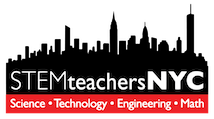Kid Talk Teacher Talk in Elementary Science
Building Student Cognitive Engagement by Enhancing Classroom Discourse
A Professional Learning Workshop for Teachers
KT3 Helps Build…
About the Program
Kid Talk teacher Talk (KT3) assists elementary teachers in asking effective launch questions for hands-on STEM investigations. As teachers experience ways to engage students in talking about scientific phenomena in a summer lab-school setting, they gain confidence and expertise to bring new strategies into their regular classroom setting. The powerful opportunity to listen closely to student conversations around science during a 2-week summer experience, coupled with support from teacher mentors, and program leaders has not only demonstrated changes and growth in student classroom discourse, but created an active, growing professional network and expanded STEMteachersNYC’s outreach to primary-grades.
Key components of the KT3 approach, which continues to be offered as part of the annual STEMteachersNYC Summer STEM Institute:
The KT3 project also builds upon research demonstrating that teachers engage their students in a more decentralized and dynamic discussion when teaching subjects with which they feel confident. KT3 builds on and extends discussion practices from high confidence subjects to all subjects discussed in the classroom. KT3 professional development workshop experiences focus on specific, natural connections to ELA as well as NGSS.
Requirements to be a Summer 2023 Host School
History of the Program
Based on the work of Hammer et.al. (2012) and Chen et.al. (2016), KT3 focuses on facilitating the transfer of existing pedagogical expertise of elementary teachers to teach reading and writing to grade-appropriate science discussions. KT3 is the result of a series of grant funded STEMteachersNYC projects, and years of collaborative work by the teachers at Montgomery Township Schools in New Jersey. Teachers came together to discuss and build on the work of Karen Gallas. Evolving the work of Math Talks already in use, and incorporating the ideas and methods behind the Science Talks and Author sessions, teachers expanded on the work around simulating the experience of being authors and scientists, and the scaffolding of cognitive change that can take place during teacher-facilitated student talk. Previous host schools include Ralphe Bunche School and PS30 in Manhattan.
The “Computational Modeling for Physics First” project, initiated and led by STEMteachersNYC in partnership with the American Association of Physics Teachers, American Modeling Teachers Association and Bootstrap, was funded in 2015 by 100Kin10 and concluded in 2018. Physics teachers from throughout the country developed innovative materials integrating computation with physics through intensive summer workshops and tested the materials in their classes. Success of this project gave rise to the NSF “Research on the Integration of Computational Modeling and Algebra-Based Physics to Improve Teaching and Learning of Computational Thinking” project, and STEMteachersNYC subsequently secured 100Kin10 funding for our 3-year “Kid Talk, Teacher Talk (KT3) in Elementary Science” project.
Source: Hammer, D., Goldberg, F. and Fargason, S. (2012). Responsive teaching and the beginnings of energy in a third grade classroom. Review of Science, Mathematics and ICT Education, 6(1), 51-72. Download)
For more information contact Yadana Nath Desmond.
Meet Members of the KT3 Team
Amy is the former K-4 Math/Science Supervisor for Montgomery Township Schools. Amy is currently an instructional coach in North Hanover, New Jersey.
Lindsay is a 1st grade teacher at MTSD. Lindsay has implemented NGSS strategies with young learners, helping them to develop language and reasoning skills. Last year, Lindsay had the opportunity to work with several English Language Learners.
Jason is the 9-12 Science Supervisor at Montgomery HS. He was trained in Modeling Instructional methods by Jess Dykes and Doug Vallett in 2007. He has worked with MHS teachers and Amy Wish to design a district wide-implementation of NGSS.
Craig is a physics teacher at Montgomery HS. He is currently a member-at-large for STEMteachersNYC and has been using modeling instruction method for several years, and is an Adjunct Instructor, Department of Physics at the College of New Jersey





